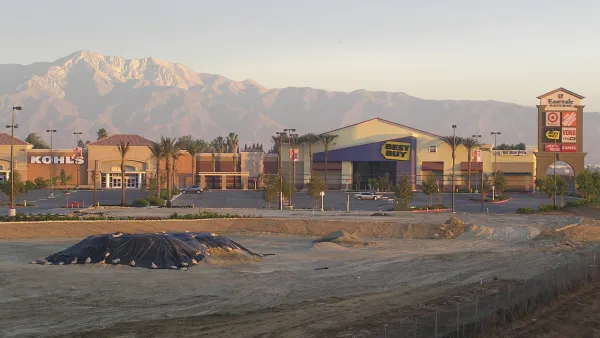According to new figures from California's Annual Planning Survey, the state's environmental law is low on the list of barriers to infill development, writes Ethan Elkind.
California's landmark Environmental Quality Act (CEQA) has been under threat of late from a broad coalition of politicians, labor leaders, and developers, who see the law as an easily abused obstacle to economic development. However, as Elkind points out, according to the results of the Governor's Office of Planning and Research's 2012 annual survey [PDF] of California's local governments, those looking to blame CEQA for preventing infill development should look elsewhere.
"Of the 423 cities (88% of all cities) and 49 counties (84% of all
counties) responding to the survey, less than 5% cited CEQA as the
primary barrier to infill development. Instead, the big 'winners' were
infrastructure constraints, lot issues, lack of funding, community
opposition, and the economy, among others. CEQA was way down on the list."
"So why do infill developers make such a big deal about CEQA?" asks Elkind. "My [Elkind's] theory
is that individual developers will be focused solely on their own
projects, and if CEQA is a threat to their investment and risk-taking,
they will understandably become CEQA haters. But perhaps this
project-based focus distorts the view of the larger forces that stifle
infill business opportunities throughout the state, such as in the
suburb with the major rail line that won't zone for more downtown
development or the rundown neighborhood near jobs and services that
needs new infrastructure."
"Ending CEQA tomorrow won't magically lift
these barriers and create new infill opportunities, and it won't
convince local communities to support new downtown development."
FULL STORY: Why Developers Shouldn’t Blame Environmental Review for the Lack of Infill

Analysis: Cybertruck Fatality Rate Far Exceeds That of Ford Pinto
The Tesla Cybertruck was recalled seven times last year.

National Parks Layoffs Will Cause Communities to Lose Billions
Thousands of essential park workers were laid off this week, just before the busy spring break season.

Retro-silient?: America’s First “Eco-burb,” The Woodlands Turns 50
A master-planned community north of Houston offers lessons on green infrastructure and resilient design, but falls short of its founder’s lofty affordability and walkability goals.

Test News Post 1
This is a summary

Analysis: Cybertruck Fatality Rate Far Exceeds That of Ford Pinto
The Tesla Cybertruck was recalled seven times last year.

Test News Headline 46
Test for the image on the front page.
Urban Design for Planners 1: Software Tools
This six-course series explores essential urban design concepts using open source software and equips planners with the tools they need to participate fully in the urban design process.
Planning for Universal Design
Learn the tools for implementing Universal Design in planning regulations.
EMC Planning Group, Inc.
Planetizen
Planetizen
Mpact (formerly Rail~Volution)
Great Falls Development Authority, Inc.
HUDs Office of Policy Development and Research
NYU Wagner Graduate School of Public Service




























